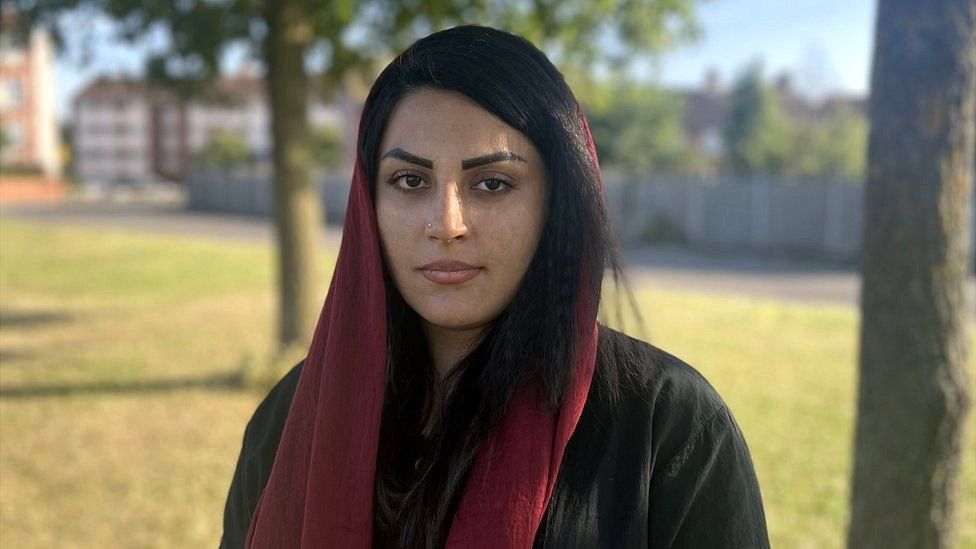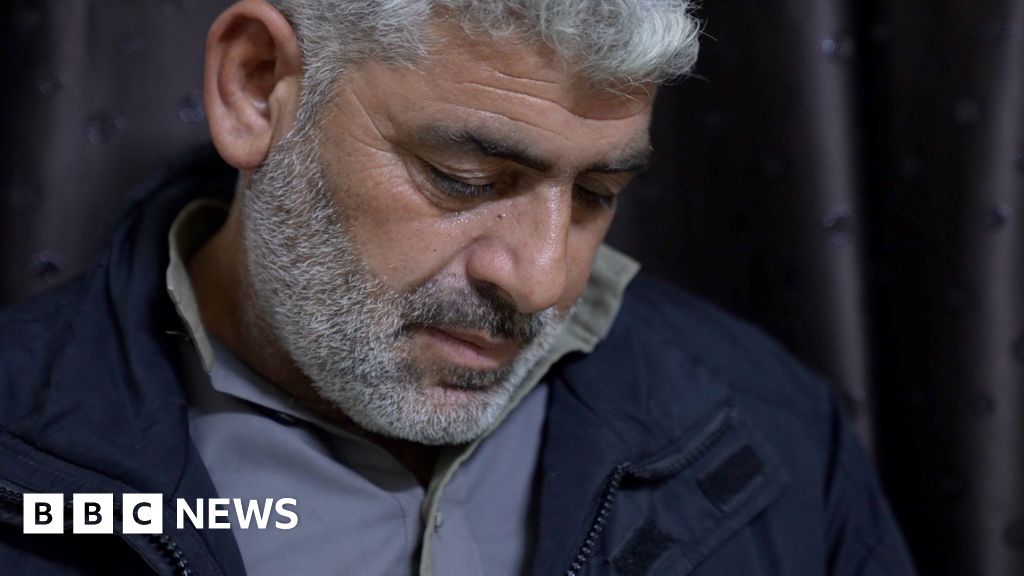ARTICLE AD BOX
By Sodaba Haidare
BBC News

Shabhnam Dawran was a TV presenter before the Taliban takeover
When the Taliban took control of Afghanistan last August, life for many women in the country changed overnight. For one TV presenter, it meant the end of her career, along with her hopes and dreams. Now, almost a year on, she is trying to a build a new life as a refugee in the UK.
On 14 August 2021, the night before the Taliban took control of Kabul, Shabhnam Dawran was preparing to present the prime time news show on Tolo News and Radio Television Afghanistan.
In recent days, the Taliban had swept across Afghanistan and had now reached the outskirts of the capital.
The 24-year-old Shabhnam was a rising star. She went on air to break the news to viewers who were glued to their TV screens following every development of the story.
"I was so emotional that I couldn't even read the lead story. People watching me at home could tell what I was going through," she says.
When she woke the next morning, Kabul had fallen to the militant group.
A Taliban member, with the group's black and white flag behind him, was now sitting in the same seat in the studio where Shabhnam had sat the night before.
It marked the end of an era.
Image source, Radio Television Afghanistan
Image caption,People were sharing before and after screengrabs from Radio Television Afghanistan
At their first official news conference, a Taliban spokesman told a room filled with journalists that women could work "shoulder to shoulder with men".
The next day, a nervous but excited Shabhnam put on her work clothes and made her way to the office.
But as soon as she arrived, she was confronted by Taliban soldiers, who she says were guarding the building and only allowing male workers to enter.
Shabhnam says a soldier told her that "in the Islamic Emirate of Afghanistan, we haven't decided about women yet". Another soldier, she says, told her: "You've worked enough, now it's our time."
When she told them she had every right to work, Shabhnam says one of the soldiers pointed his rifle at her, placed his finger on the trigger and said: "One bullet will be enough for you - will you leave or should I shoot you here?"
She then left, but posted a video describing the encounter on social media. It went viral, putting her and her family's life in danger.
She packed a small bag and fled the country a few days later, taking her two younger siblings - Meena and Hemat - with her.
Shabhnam (left) with her younger brother and sister, Hemat and Meena, in their local park in north London
A new life
Shabhnam and her siblings later arrived in the UK, along with thousands of other Afghan refugees. They faced a long wait to be settled.
As a refugee with no English and limited job prospects, Shabhnam had a hard time adjusting to her new surroundings.
"I feel like I lost the six years I worked in Afghanistan. Now I have to learn English and go to university. On the first days we couldn't even go shopping. If we needed some essentials, we couldn't express what we wanted. It was extremely difficult and painful."
Almost a year on, the majority of recent Afghan refugees in the UK remain in hotels across the country. Shabhnam and her siblings, however, have been lucky - they were provided with a council house earlier this year.
"Our life starts now. We're like a new baby that has to start from the very beginning," she says with a smile as she instructs her sister Meena to put the kettle on to make "chai sabz", the traditional Afghan green tea that contains cardamom.
They are slowly getting used to life in London and have been enjoying their first English summer, though they still miss home.
"I'm a local now," Shabhnam says, giggling. She knows where to find the bakery with the warm bread that looks and smells like the ones they had back home, and where to get the best dried fruit and green tea.
She and her sister are now studying English at a college and her brother attends secondary school.
Shabhnam and Meena are adjusting to life in London - and their new home
Shabhnam believes her family has been well supported by the UK government, but worries about other Afghan refugees, some of whom are her friends. She says their plight has been overshadowed by the war in Ukraine.
"Processing the cases of Afghans, and especially those stuck in hotels, has been massively delayed because of Ukrainian refugees. They [the British government] have put a limit on Afghans coming to the UK but not on Ukrainians. They shouldn't have behaved like that with Afghans."
The BBC put her concerns to the UK Home Office. It said: "It is wrong to set these two vulnerable groups against each other. Our Afghan Citizens Resettlement Scheme will provide up to 20,000 women, children and other at risk groups with a safe and legal route to resettle in the UK.
"The housing of Afghan individuals and families can be a complex process. We are working with over 300 local authorities across the UK to meet the demand and have moved - or are in the process of moving - over 6,000 people into homes since June 2021."
A lot has changed in Afghanistan since Shabhnam left home. Girls have been banned from going to secondary school in most parts of the country, parks have been segregated and women have been ordered to cover their faces.
This rule has particularly affected female TV presenters who have been forced to wear face coverings on air.
Image source, Reuters
Image caption,The Taliban have ordered female presenters to cover their faces when appearing on TV
Shabhnam sympathises with her colleagues who have no choice but to accept the harsh edicts if they wish to continue working.
"[The Taliban] want to force women to say 'we give up, we don't want to come to work anymore and we submit to staying at home'," she says. "Until they change their way of thinking, they'll not bring a positive change in society."
But she has not given up hope of one day returning to Afghanistan.
"Like a glass that falls on the floor and breaks into pieces, my hopes, plans and dreams were shattered," she says.
"I hope for a day when Afghanistan is a place where people are not just surviving - but thriving. I will not be in doubt of returning then."

 2 years ago
30
2 years ago
30








 English (US) ·
English (US) ·